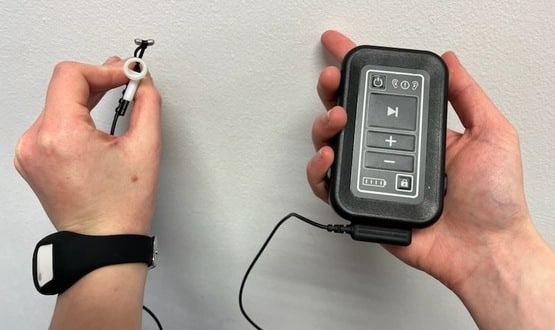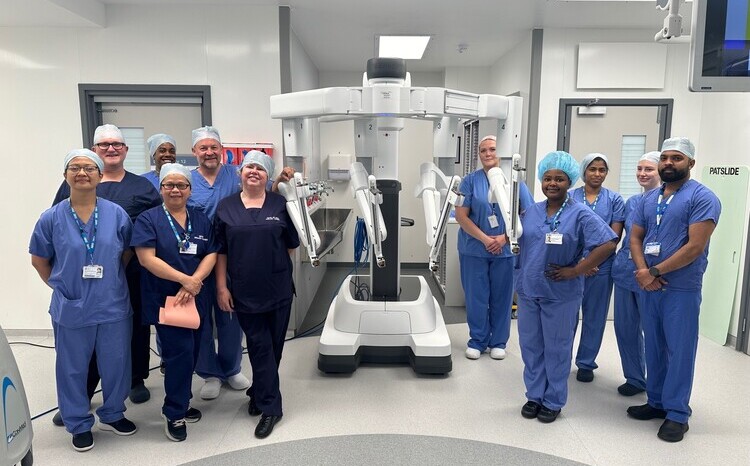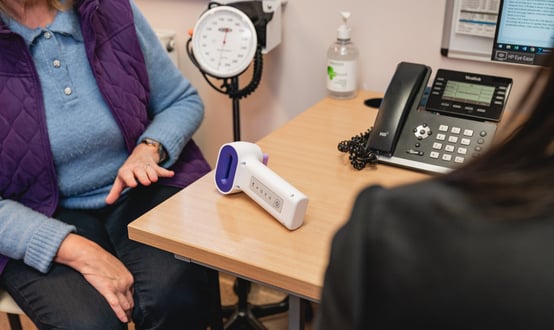Sheffield Teaching Hospitals trials nerve stimulation for stroke recovery
- 26 January 2024

Sheffield Teaching Hospitals NHS Foundation Trust is working with the University of Sheffield to test a new nerve stimulation therapy that could help play a major role in improving arm recovery after stroke.
Researchers will be studying the new stroke treatment to determine if transcutaneous vagus nerve stimulation has the potential to improve hand and arm weakness, when given a self-delivered treatment during stroke rehabilitation therapy.
The £2m TRICEPS trial is the first of its kind to explore the therapy and if successful, will enable the treatment to be rolled out to larger numbers of stroke patients, at cost and at scale. It will build on the results of a recent clinical trial that showed that stimulating damaged areas of the brain using invasive vagus nerve stimulation helped to improve arm recovery for stroke patients.
Unlike the clinical trial – which saw electrical stimulators implanted in the chest – this therapy trial is using a portable, pace-maker-like device that delivers electrical pulses to the brain. The device is lightweight and connected to a wired earpiece. Used while the participant is undergoing rehabilitation therapy, when they move their arm, the connected earpiece will gently tickle the ear.
Professor Arshad Majid, consultant neurologist at Sheffield Teaching Hospitals NHS Foundation Trust, professor of cerebrovascular neurology at the University of Sheffield and chief investigator of the trial said: “We are really excited to be launching this new study. In a very small preliminary trial, we showed that gently ‘tickling’ a nerve at the ear using mild electrical pulses improved arm and hand weakness after stroke when used in conjunction with stroke rehabilitation therapy.
“In our new trial we hope to establish if these findings can be replicated in larger numbers of patients, without the need for surgery, so that stroke survivors can access transcutaneous vagus nerve stimulation as part of their at-home rehabilitative therapy and care. By conducting this trial, we also hope to provide definitive answers as to whether this is an effective approach in improving recovery after stroke that can be rolled out at scale to large numbers of patients on the NHS.”
The trial is funded by a partnership between the National Institute for Health and Care Research (NIHR), the Medical Research Council and the Association of British Neurologists Fellowship. It will run for two years, and enrol up to 243 patients from 15 UK stroke centres. Participants will be asked to wear the device for an hour, five times a week, while they complete their stroke rehabilitation exercises at home. Some participants will also be asked to have an MRI scan so researchers can understand the mechanisms behind the vagus nerve stimulation, while others will be asked to wear the device while carrying out their usual daily activities as well.
The end of last year saw Sheffield Teaching Hospitals receive £3 million from NIHR to establish a new national HealthTech Research Centre, tasked with developing innovative health technologies for the management and treatment of long-term conditions.





2 Comments
How does a patient get to be included in this trial?
I am not sure, but you can try contacting Professor Arshad Majid, who is a consultant neurologist at Sheffield and is the chief investigator of the TRICEPS trial.
Comments are closed.